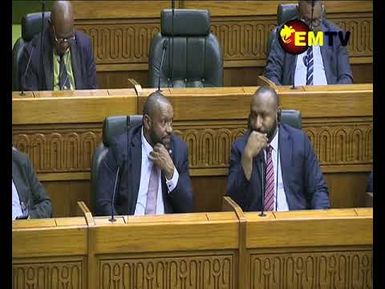PRIME MINISTER SAYS STANDING ORDERS FOLLOWED
- Description:
- After the Vote of No Confidence decision was made by the speaker to put the motion on the notice paper in parliament yesterday, Prime Minister James Marape called for a dissent. In a press conference following the parliament sitting, Prime Minister Marape clarified that Section 96 of the standing orders allows anyone to call for a dissent. This provision enables members to formally express their disagreement with the decision and initiate a process to challenge or review it.
- Display date:
- 07/06/2024
- Location:
- Papua New Guinea
- Collections:
- EMTV Online Videos
- Content partner:
- EMTV Online
- Availability:
- Not specified
-
Copyright status: UnknownFind out more about what you are able to do with this itemWe haven't been able to determine the rights status of this item. It may be suitable for sharing, modification and commercial use, but you will need to check with EMTV Online about its specific terms of use, and may need to undertake research to find the creator and publisher of each object to determine this. For more information, please see our use and reuse page..What can I do with this item?Non-infringing useNZ copyright law does not prevent every use of a copyright work, and this item may be hosted by an international institute or organisation. You should consider what you can and cannot do with a copyright work.Check before sharingYou'll need to confirm with the copyright holder before copying and/or sharing this item with others. This includes posting it on your blog, using it in a presentation, or any other public use.Check before modifyingYou'll need to confirm with the copyright holder before modifying, remixing, or building upon this item.Check about commercial useYou'll need to confirm with the copyright holder using this item for commercial purposes.
Welcome and warm Pasifik greetings
The information on this site has been gathered from our content partners.
The names, terms, and labels that we present on the site may contain images or voices of deceased persons and may also reflect the bias, norms, and perspective of the period of time in which they were created. We accept that these may not be appropriate today.
If you have any concerns or questions about an item, please contact us.

